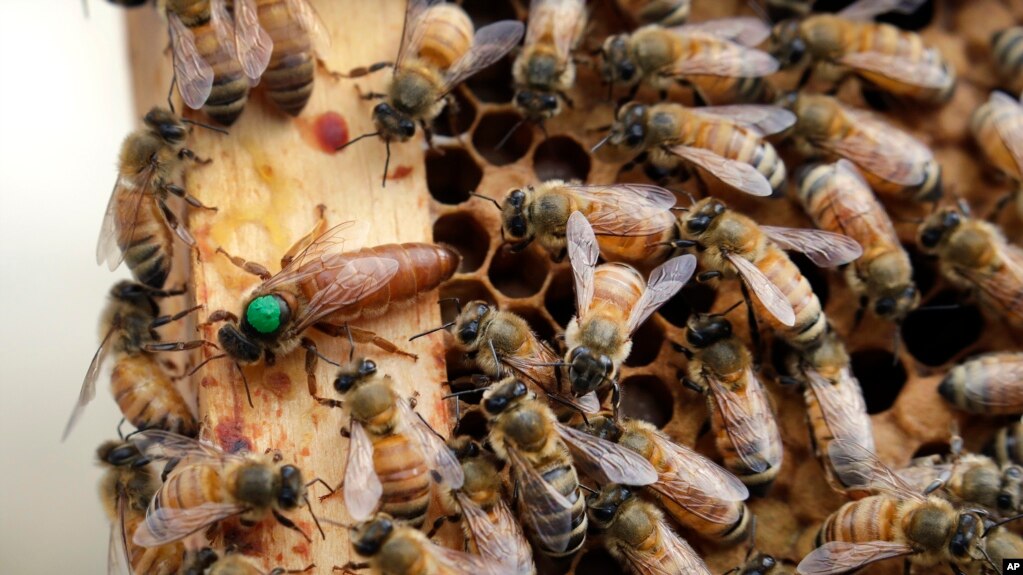ミツバチ、すごいサバイバル能力ですね。
知っていましたか? 蜂蜜の威力を、今や医療にも使われ、その効能は計り知れず。
ちょうど今年初春、ニュージーランドに行きました。
そこで知ったのがマヌカハ二―のすごさ!!
抗菌作用、多くの病原微生物にも効果が示されています。
コロナにも、と期待してしまいます。
そんなハニーの生みの親、蜜バチさんのお話しです。
皆で守ろう、ハ二―ビー!!!
VOAニュースより。
- 米国の科学者: ミツバチは悪い年の後に改善を示す
- 蜂蜜の効用
- 最強蜂蜜ーマヌカハ二―
- 原文 US Scientists: Honeybees Show Improvement After Bad Year
- Words in This Story
米国の科学者: ミツバチは悪い年の後に改善を示す
US Scientists: Honeybees Show Improvement After Bad Year
新しい研究では、アメリカのミツバチの人口は、前年に大きな損失を被った後、ゆっくりと回復していることが示されています。
米国の養蜂家は、2019年10月1日から今年の3月31日まで、過去の冬の間にミツバチのコロニーのわずか22.2パーセントを失っただけでした。それは 28.6 パーセントの冬の平均損失よりも低いのです。
これらの数字は、蜂情報パートナーシップと呼ばれるグループから来ています。彼らは、米国の数千人の養蜂家を対象とした最近の調査を実施しました。
調査によると、昨年の冬の損失は14年間の調査の中で2番目に小さいことがわかったのです。昨年の冬の損失は、コロニーの記録的な37.7パーセントが死亡した2018-2019年の冬よりも少なかった、ことを研究者は発見しました。
その冬の後、養蜂家が32%の損失率を報告した2019年夏まで損失は続いていました。しかし、その割合は夏の損失の平均21.6パーセントよりも高かったのです。
ナタリー・スタインハウアー氏は、Bee Informed Partnershipのメンバーです。彼女は、夏の損失率は高かったが、冬の死は "本当にコロニーの健康をテストするもの "だとAP通信社に語りました。スタインハウアー氏は、今回の調査結果は昆虫にとって良いニュースだと考えています。「非常に良い年であることが判明したのです。 」と彼女は言います。
歴史的に、ミツバチの個体数は通常、悪い年の後に良い年が来るのです、とスタインハウアー氏は付け加えています。
調査には、全国の養蜂家3,377人の合計が含まれています。他の人はちょうど趣味として自宅でミツバチを維持しながら、いくらかの利益のためのビジネスを運営しています。
ジェリーブロメンシェンク氏はモンタナ大学の蜂の専門家です。彼は調査の一員ではありません。彼は、低い冬の損失が 2020 年に良い結果をもたらすことを期待している、と AP通信に 話してくれました。ブロメンシェンク氏は、天候が協力し、養蜂家が良いコロニー管理を行えば、それが可能になると考えていると述べています。
米国の養蜂家はまた、生存の可能性を向上させるために、冬の間天耐候地域 にコロニーの多くを移動させるかもしれません、と昆虫を研究しているキースデラプレーン氏述べています。彼はジョージア大学にいます。
米国農務省の新しい研究では、冬を乗り切るためにミツバチを「低温貯蔵庫」に入れることを提案している。
科学者たちは、世界の食糧供給にとって重要な動物性受粉者の人口が減少していることを長い間見守ってきました。
ミツバチは、最も簡単に追いかけることができる花粉媒介者の一つです。しかし、専門家によると、ミツバチは病気、ダニ、化学製品、食料の損失によって脅威にさらされているといいます。
スタインハウアー氏は、彼女と他の科学者は、"新しい通常の一部 "として現在の損失率を見ているのです、と述べました 。
蜂蜜の効用
人類は石器時代から蜂蜜を重宝してきており、紀元前8000年ごろの岩壁には蜂蜜の収穫の様子が描かれているそうです。
古代ギリシャ人、ローマ人、中国人は蜂蜜を傷の軟こうや、発熱や胃腸障害の治療薬として使っていたそうです。そして今日も、蜂蜜にはがんや心臓病の予防をはじめ、潰瘍(かいよう)の減少、消化不良の軽減、血糖値の調節、せきやのどの痛みの緩和、運動能力の向上など、驚くべき治癒力や効果があるとされるいます。
最強蜂蜜ーマヌカハ二―
原文 US Scientists: Honeybees Show Improvement After Bad Year
 In this Aug. 7, 2019, file photo, the queen bee (marked in green) and worker bees move around a hive at the Veterans Affairs in Manchester, N.H. (AP Photo/Elise Amendola, File
In this Aug. 7, 2019, file photo, the queen bee (marked in green) and worker bees move around a hive at the Veterans Affairs in Manchester, N.H. (AP Photo/Elise Amendola, File
A new study shows the American honeybee population is slowly recovering after suffering major losses the year before.
Beekeepers in the United States lost only 22.2 percent of their honeybee colonies during the past winter, from October 1, 2019 to March 31 of this year. That is lower than the average winter loss of 28.6 percent.
Those numbers come from a group called the Bee Informed Partnership. It organized a recent survey of thousands of U.S. beekeepers.
The survey found that last winter was the second smallest winter loss in 14 years of studies. The loss last winter was less than the winter of 2018-2019, when a record 37.7 percent of colonies died off, researchers found.
After that winter, the losses continued through the summer of 2019, when beekeepers reported a loss rate of 32 percent. Yet that rate was higher than the average of 21.6 percent for summer losses.
Nathalie Steinhauer is with the Bee Informed Partnership. She told The Associated Press that although the summer losses were higher, the winter deaths are “really the test of colony health.” Steinhauer believes the findings are good news for the insects. “It turned out to be a very good year,” she said.
Historically, honeybee populations usually have good years following bad ones, Steinhauer added.
The survey involved a total of 3,377 beekeepers nationwide. Some operate businesses for profit, while others just keep bees at home as a hobby.
Jerry Bromenshenk is a bee expert from the University of Montana. He was not part of the survey. He told the AP he hopes a lower winter loss will bring better results in 2020. Bromenshenk said that he thinks that can happen if the weather cooperates and beekeepers exercise good colony management.
U.S. beekeepers might also move more of their colonies to weather-resistant areas during the winter to improve the chances of survival, said Keith Delaplane, who studies insects. He is with the University of Georgia.
New U.S. Department of Agriculture research suggests putting bees in “cold storage” to help them get through the winter.
Scientists have long watched the population of animal pollinators – which are critical to the world’s food supply - shrink.
Honeybees are among the easiest pollinators to follow. But experts say they are threatened by diseases, mites, chemical products, and loss of food.
Steinhauer said she and other scientists are seeing the current loss rates as “part of the new normal.”
Words in This Story
honeybee – n. a kind of bee that lives with others in a hive and makes honey
hobby – n. an activity someone does for pleasure when they are not working
management – n. the control and organization of something
pollinate – v. to take pollen from one plant or part of a plant to another so new plant seeds can be produced
mite – n. a very small animal similar to a spider